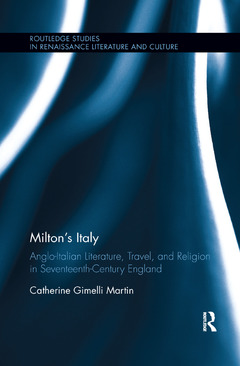Description
Milton's Italy
Anglo-Italian Literature, Travel, and Connections in Seventeenth-Century England
Routledge Studies in Renaissance Literature and Culture Series
Author: Martin Catherine
Language: English
Subjects for Milton's Italy:
Keywords
Paradise Lost; Anglo-Italian Studies; Ad Patrem; Cosmology; CPB; Dante; Istoria Del Concilio Tridentino; European Comparative Literature; Christ Child; Italian Neoplatonism; Milton’s Antiprelatical Tracts; Italy; Il Penseroso; John Milton; Carlo Dati; Literature; Milton; Italian Humanism; Milton Studies; Epitaphium Damonis; Charles Diodati; Petrarch; Accademia Fiorentina; Religious History; Samson Agonistes; Renaisance Literature; Double Justice; Renaissance Italy; Young Men; Research; Nativity Ode; Romance Epic; Milton’s Masque; Milton’s Lady; Seventeenth-century Italy; Milton’s Commonplace Book; Sola Fideism; Stripling Cherub; Nicholas III; Early Opera; Hill Top
Approximative price 50.12 €
In Print (Delivery period: 14 days).
Add to cartPublication date: 05-2019
· 15.2x22.9 cm · Paperback
Publication date: 12-2016
· 15.2x22.9 cm · Hardback
Description
/li>Contents
/li>Readership
/li>Biography
/li>
This book joins a growing trend toward transnational literary studies and revives a venerable tradition of Anglo-Italian scholarship centering on John Milton. Correcting misperceptions that have diminished the international dimensions of his life and work, it broadly surveys Milton?s Italianate studies, travels, poetics, politics, and religious convictions. While his debts to Machiavelli and other classical republicans are often noted, few contemporary critics have explored the Italian sources of his anti-papal, anti-episcopal, and anti-formalist religious outlook. Relying on Milton?s own testimony, this book explores its roots in Dante, Petrarch, Ariosto, and that great "Venetian enemy of the pope," Paolo Sarpi, thereby correcting a recent tendency to make native English contexts dominate his development. This tendency is partly due to a mistaken belief that Italy was in steep decline during and after Milton?s travels of 1638-1639, the period immediately before he produced his prose critiques of the English Church, its canon law, and its censorship. Yet these were also fundamentally "Italian" issues that he skillfully adapted to meet contemporary English needs, a practice enabled by his extraordinarily positive experience of the Italian language, cities, academies, and music, the latter of which ultimately influenced Milton?s "operatic" drama, Samson Agonistes. Besides republicanism and theology (radical doctrines of free grace and free will), equally strong influences treated here include Italian Neoplatonism, cosmology, and romance epic. By making these traditions his own, Milton became what John Steadman once described as an "Italianate Englishman" whose classical "literary tastes and critical orientation?were?to a considerable extent" molded by Italian critics (1976), a view that is fully credited and updated here.
Introduction: Italian Self-Fashioning 1. The Canonical Milton and the Myth of Italy: Problems of Fact and Interpretation 2. Beyond the Alps: Milton’s Anglo-Italian Journey and its Contexts 3. Qualifying Milton’s Anti-Catholicism: the Proto-Protestant Reformers, Trent, and Beyond 4. Amazing Grace: Milton’s Mediation of Reformed and Roman Catholic Doctrine 5. The Republic of Letters and Furores of Inspiration: Neoplatonism in Milton’s Early Latin and English Verse 6. Disarming Grace: The Legacy of Beatrice and Laura 7. The Italian Context of Milton’s Neo-Roman Politics 8. Milton’s Italianate Epic: From Dante to Heroic Romance in "Paradise Lost" 9. The Tragic Music of Samson Agonistes in the Age of Monteverdi
Catherine Gimelli Martin is Professor of English at the University of Memphis, USA.
These books may interest you

The Value of Milton 26.37 €



